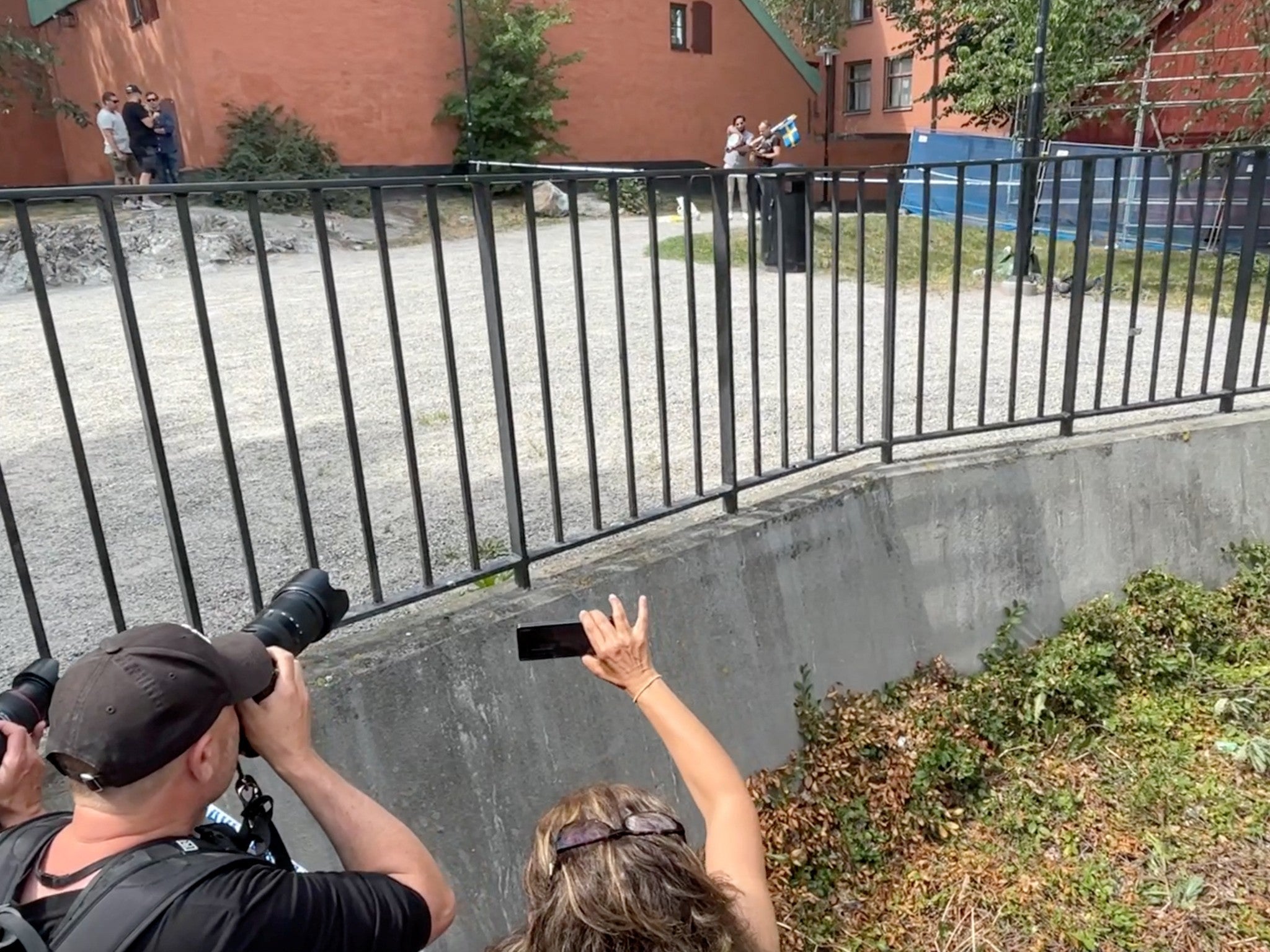Man tears up and burns Quran in protest approved by Swedish police
The decision to grant permission for the protest is likely to spark a fresh diplomatic row with Turkey, as Anakara continues to delay Stockholm’s push to joing Nato

Your support helps us to tell the story
From reproductive rights to climate change to Big Tech, The Independent is on the ground when the story is developing. Whether it's investigating the financials of Elon Musk's pro-Trump PAC or producing our latest documentary, 'The A Word', which shines a light on the American women fighting for reproductive rights, we know how important it is to parse out the facts from the messaging.
At such a critical moment in US history, we need reporters on the ground. Your donation allows us to keep sending journalists to speak to both sides of the story.
The Independent is trusted by Americans across the entire political spectrum. And unlike many other quality news outlets, we choose not to lock Americans out of our reporting and analysis with paywalls. We believe quality journalism should be available to everyone, paid for by those who can afford it.
Your support makes all the difference.A man tore up and burned a copy of the Quran outside a mosque in Sweden on the first day of Eid – after police granted permission for the demonstration
Police later charged the man with agitation against an ethnic or national group. While Swedish police have rejected several recent applications for anti-Quran demonstrations, courts have overruled those decisions, saying they infringed on freedom of speech.
“It’s legal but not appropriate,” Sweden’s prime minister Ulf Kristersson said. The protest risks sparking a fresh diplomatic row with Turkey, who have been holding up Sweden’s bid to join Nato – an application made in the wake of Russia’s invasion of Ukraine – over such protests, as well as accusations from Ankara that Stockholm is harbouring people it considers terrorists. Turkey has asked for a number of extraditions and for Sweden to address its security concerns.
At the protest, some 200 onlookers witnessed one of the two organisers tearing up pages of a copy and wiping them on his shoe – before eventually setting the book on fire. After the burning, police charged the man who set fire to the Quran with agitation against an ethnic or national group and with a violation of a ban on fires that has been in place in Stockholm since mid-June.
Some of those present shouted “God is great” in Arabic to protest against the burning, and one man was detained by police after he attempted to throw a rock. Representatives of the mosque were disappointed by the police decision to grant permission for the latest protest on the Muslim holiday of Eid al-Adha, mosque director and imam Mahmoud Khalfi said on Wednesday.
“The mosque suggested to the police to at least divert the demonstration to another location, which is possible by law, but they chose not to do so,” Mr Khalfi said in a statement.
Sweden applied to join the alliance in the wake of the Kremlin launching its invasion of Ukraine last year, alongside neighbour Finland. The pair decided to drop their long-held stance of military neutrality in the face of Moscow’s aggression. Finland was welcomed into the bloc in April, and there were hopes that Sweden could follow suit at a summit in Lithuania in July. But that requires sign-off from all the bloc members. Beyond Turkey, Hungary has also been dragging out ratifying the move, despite officials suggesting they were behind the move.
The Nato secretary-general, Jens Stoltenberg, announced on Wednesday that he has called a meeting of senior officials from Turkey, Sweden and Finland on 6 July, ahead of the summit later in the month, to try to overcome Turkish objections. “The time is now to welcome Sweden as a full member of Nato,” Mr Stoltenberg told reporters as he announced his last-ditch effort. Foreign ministers, intelligence chiefs and security advisers from Turkey, Sweden and Finland, which joined Nato in April, will be taking part in the talks in Brussels.
But the chance of membership being granted in July now looks increasingly remote. The Turkish foreign minister, Hakan Fidan, condemned the protest as “vile” in a tweet. He added that it was unacceptable to allow anti-Islam protests in the name of freedom of expression. In late January, Turkey suspended talks with Sweden on its Nato application after a Danish far-right politician burned a copy of the Quaran near the Turkish embassy in Stockholm.
In a phone call – that took place on Wednesday seemingly before the latest burning – Turkey’s president Recep Tayyip Erdogan told the German chancellor, Olaf Scholz, that while Sweden had taken steps in the right direction, there were still aspects of their behaviour that were “unacceptable” to Ankara.
Meanwhile, Hungary’s parliament postponed ratifying Sweden’s Nato accession to its autumn legislative session. The postponement is the latest in a long line of delays that have gone on for a year.
Join our commenting forum
Join thought-provoking conversations, follow other Independent readers and see their replies
Comments